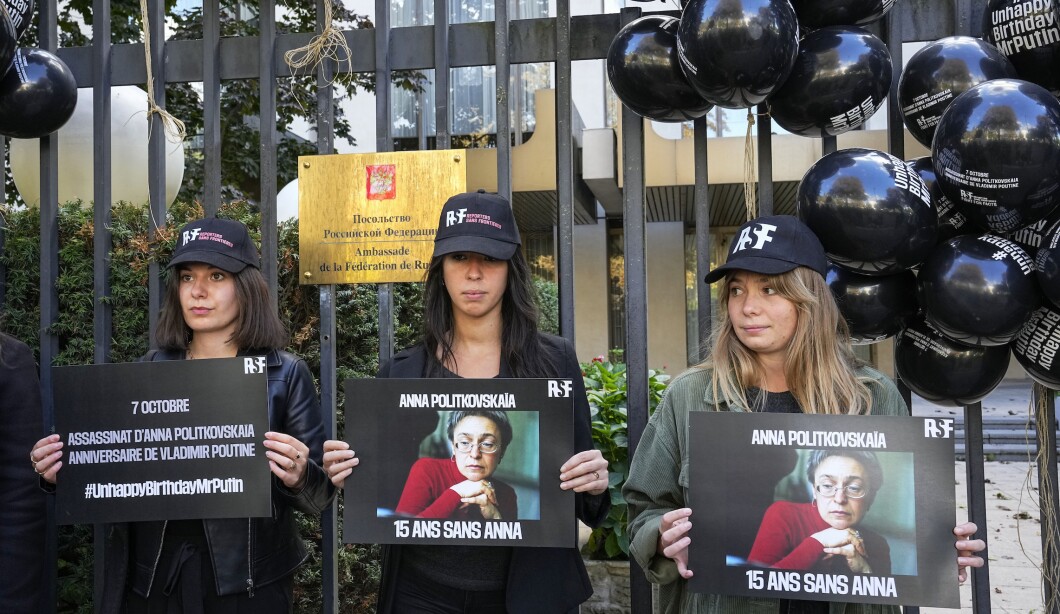
As if falling ill on an overnight train ride to Munich wasn’t bad enough, the dissident Russian journalist received a scolding from a frustrated German detective.
The detective was a veteran of multiple similar investigations, including one that led to the conviction of an assassin imprisoned for “state-sponsored terrorism.” The journalist, a young woman who had been warned previously that Russian President Vladimir Putin‘s associates intended to kill her, had suffered from a series of mysterious and miserable ailments for three months.
BIDEN HEADS TO WISCONSIN NECK AND NECK WITH TRUMP
She had brought her case to multiple perplexed doctors but had not called the police. “I don’t understand why it took you so long to contact us,” the detective told former Novaya Gazeta reporter Elena Kostyuchenko. “You think you’re in some kind of paradise. No one even considers taking security precautions. We have political murders happen here. Russia’s secret services are active in this country. And your recklessness, yours and your colleagues’, is just beyond the pale.”
Kostyuchenko had been forced to stop covering the war in Ukraine after learning from multiple sources that she’d been marked for assassination by Chechen strongman Ramzan Kadyrov. She’d laughed off the idea that Putin’s henchmen would follow her to Munich or beyond, but she is just one of a number of Russian dissidents who have “succumbed to a similar set of strange and alarming physical ailments” since Putin launched his campaign to overthrow the Ukrainian government last year, according to an investigation by independent Russian journalists.
“I knew that journalists get killed, but I didn’t want to think about someone trying to kill me,” Kostyuchenko wrote of her experience for Meduza, a Latvia-based outlet founded by another group of independent Russian journalists. “It was a mixture of revulsion, shame, and exhaustion that turned me away from this idea.”
Her personal affliction is far from unique; indeed, she was reporting from Ukraine for the same newspaper that employed the late Anna Politkovskaya, the famed Russian journalist who was murdered in 2006 after years of covering war crimes and other human rights abuses perpetrated by the Russian military, and the Kadyrovites, during the Second Chechen War.

Yet the full-scale invasion of Ukraine has spurred a mass exodus of Russian dissidents while riveting global attention on a Kremlin chief keen to impose draconian punishments on Russians who challenge his control of domestic public opinion. The interplay of interests has led to an apparent expansion of Russian intelligence operations against expatriate critics on a scale that evokes memories of Soviet tyrant Joseph Stalin’s relentless pursuit of erstwhile revolutionary ally Leon Trotsky.
“Stalin actually had a kind of a huge network of operatives around the world who were hunting the emigres,” the University of Chicago’s Konstantin Sonin, himself and expatriate Russian and Putin critic, recalled in a discussion with the Washington Examiner. “It’s sort of a way of living that you spend a lot of money and effort on spying. And Putin, because he’s cosplaying the Soviet Union, he also has these huge spy networks and spent a lot of money on this.”
Those threats persist, even though Western allies have taken major steps to curtail Russian intelligence operations in Europe in recent years. Then-British Prime Minister Theresa May expelled 23 Russian officials after the poisoning of former double agent Sergei Skripal and his daughter in 2018. And Czech officials cracked down on a Prague embassy regarded as Russia’s major central European spy hub in 2021 after concluding that a 2014 explosion on Czech territory was caused by Russian operatives trying to interdict a weapons shipment from Bulgaria to Ukraine.
And the Western counterintelligence hunts continue, as evidenced Tuesday by British media revelations that a “rundown seaside guesthouse” on England’s eastern coast was the scene of a raid targeting a Bulgarian trio reportedly accused of spying on behalf of Russia.
“There was a big crime scene tent outside the door of the Haydee and there were a load of plain police vans with blacked-out windows,” local hotel bar manager Moira Scott told the Times of London. “There was a lot of men dressed in black clothes with their faces covered, coming and going. They had balaclavas on as if they didn’t want anyone to recognize them, which I thought was a bit weird. I couldn’t see their faces.”
Bulgaria, a NATO ally and an important supplier of ammunition and fuel for embattled Ukrainian forces last year, nonetheless remains “a fertile ground” for Russian intelligence operatives.
“There are a lot of people who work for Russia,” Sonin observed. “It should be a fertile ground for all kinds of Putin’s spies operations, especially because they have very lax rules for Russians to come there. And a lot of Russian — I mean, in the last 10 years before the war — they emigrated to Bulgaria because it’s just so easy to live in Bulgaria.”
Kostyuchenko is one of three expatriate Russian journalists spotlighted by The Insider, an independent Russian outlet that participated in an award-winning investigation to identify “the real people behind the cover personas” of the two men whom British officials blamed for the assassination attempt against the Skripals. German officials closed the investigation in May without a conclusive finding, only to renew the inquiry in July.
“Kostyuchenko was very likely poisoned. That, at least, is the conclusion of a half dozen doctors, scientists and chemical weapons experts whom The Insider has consulted about her case, which has not been publicized until now,” the Insider concluded. “And Kostyuchenko isn’t the only suspected poison victim. She is part of a trio of muckraking Russian journalists and dissidents … who in the past year have succumbed to a similar set of strange and alarming physical ailments, with circumstantial evidence suggesting foul play.”
They aired that assessment as a warning to other expatriates. “I want to live — and that’s why I’m writing this text,” Kostyuchenko wrote. “I also want my colleagues, my friends, political activists, and refugees who are now abroad to remember to be careful. More careful than I have been. We are not safe, and we will never be safe until the political regime changes in Russia. Our work is what hastens its end, but the regime will defend itself.”
CLICK HERE TO READ MORE FROM THE WASHINGTON EXAMINER
Sonin, who said he “takes precautions” against the possibility of similar attempts on his life, regards the overseas attacks as an exercise in malevolent futility.
“We have this evidence that some journalists were targeted by FSB assassins, but these people — I mean, there are hundreds of journalists, perhaps 1000s of them,” he said. “So it seems that [the FSB is] just spending a lot of money on these crazy operations. And this does not — it doesn’t actually help … Putin’s cause. It’s just the way they live.”





